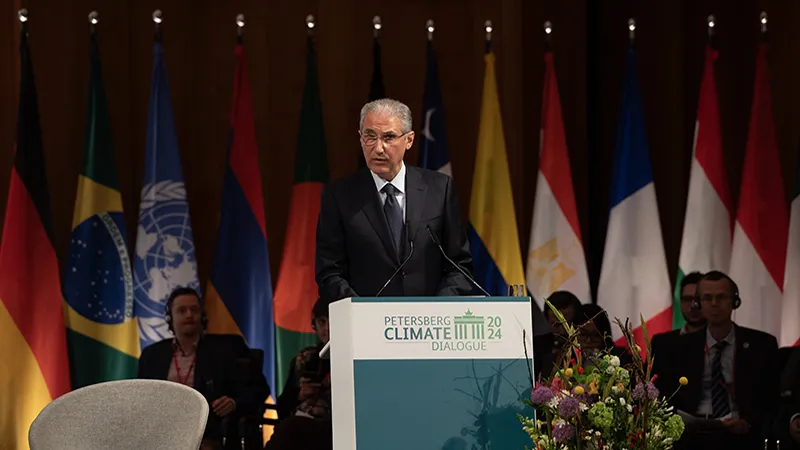Reimagining the way the finance world works to consider climate is going to feel “uncomfortable” and not without pain or challenge, said the CEO of the PRI talking to ESG Clarity from COP28, but it is increasingly happening.
David Atkin said the finance world and the investment piece are the “enablers of change”, and he is pleased with progress made as climate is increasingly considered in decisions, but there is still so much more to be done to accelerate the transition – it needs to be “ratcheted up”.
He also shares the PRI’s involvement with the recently announced Taskforce on Net Zero Policy.
Check the out full video interview above or read the transcript below:
NK: Hello and welcome to this COP28 video. I’m delighted to be joined by David from the Principles for Responsible Investment. Thank you very much for your time today. How is it all going over in Dubai?
DA: Thanks, Natalie. And great to join you. It’s been a very busy few days. Increasingly every year it just ratchets up in terms of the level of interest and the level of engagement, but also the number of parties that are here. And yes, you can be cynical about outcomes and so forth, but the fact that we’ve got so many parts of the globe and so many parts of the economy here, which just tells you that the transition everyone understands is required.
And really the challenge here is to think about how we’re going to decarbonise our economy in a way that is in the timeframes that we have to us, which as we know, is rapidly shrinking because we haven’t had enough substantive change. That change is in the wind, but it needs to be ratcheted up. And, we’re hoping that this conference can continue that momentum.
NK: Okay. Well, yeah, you do sound optimistic. And that from the people I’ve spoken to so far, there’s been a real split. And obviously this has been about where it is positioned and some of the inclusion of some of the sectors has made this COP quite controversial from the start. But also they’ll have people saying, well, we need those stakeholders in the room and that’s how we’re going to get this transition going. What’s your feelings around that? Are you feeling that sort of split and indecisiveness around it at the moment?
DA: Well, let’s be honest with ourselves. I mean, the fact that you’re trying to make such a massive change to the way in which the world is structured, it’s not going to be without pain and it’s not going to be without challenge.
And you’re going to have very varying different perspectives. It just depends. You can easily develop a narrative that is critique critical of where we are because the bottom line is the world is not going fast enough on the transition. So right now where we are, we’re going to exceed to 1.5, 2.4, 3 degree increase.
So it’s right that there is this pressure. At the same time, if you look at it from our perspective, we see the finance space and the investment piece as one of the enablers for the change. And we can see in our own world that the way in which decisions are being made are increasingly factoring in the climate piece and the broader sustainability piece.
The challenge for all of us is that in a way we are reimagining the way finance works, and that’s not something that you can just click your fingers and happens overnight. This is still a very new industry and so we’re building the plane while we fly it. So it’s a very uncomfortable feeling. But the truth of it is if you look back three years ago to where we are now, actually, there’s been quite a lot of progress. The building blocks are being put in place.
As I travel around the world, it’s not a lack of technological innovation and it’s not a lack of capital. What we need is the right policy enabling environment that enables the technology to be scaled up and invested into by our sector. And if we get those and if we get those three things working in harmony, then we can fast track the accelerate the transition.
NK: Okay, great. And one of the announcements this week, the PRI has been involved with on policy is the Taskforce on Net Zero Policy. Could you tell us a bit more about that? What is it going to be trying to achieve?
DA: We’re very delighted to be offered the opportunity to play the secretariat role for the taskforce, The taskforce for dealing with the policy hurdles around the transition to net zero came out of one of the recommendations of last year, reported COP, recommendation 10, which talked about the need to bring together the practitioners and the industry with policymakers and to share thinking, look at best practice, look at what the hurdles that is preventing that acceleration to net zero. The PRI has been offered the opportunity to play that secretariat role. So we’re delighted because we think that it’s through that collaboration that we’re going to see an improved policy settings that will enable investors and the innovation that we’ve talked about, technological innovation, to really start to come.
It’s very exciting. It’s still very early days. We’ve got to develop out the programme of work, the governance, work out exactly who’s going to be involved. But what we can say is that we’ve had very strong institutional support from organisations around the globe about the announcement, and we will be looking forward to making some interim reportage at next year’s COP on the progress of the taskforce as we work into it into 2024.
NK: Okay, fantastic. There’s lots of detail to be worked out, but is there anything else that you’re hoping for from this COP?
DA: So first of all, to acknowledge that there’s been some really significant initiatives already announced. One I would like to call out is the GFANZ capacity building initiative, which addresses this problem that we have that as we’re trying to move from target setting to actual implementation, recognising that there is a skill set and experience set, a cap and a capacity compatibility piece that needs to be addressed.
There’s a whole range of organisations that are now going to step into that space and work in a very collaborative way. The other thing that we’re hoping to see is just reinforcing that the role the private sector has to play in accelerating the change. The public sector is always going to be the foundational point, but the private sector can be an enabler and an accelerator, if we work in a more collaborative and cohesive way. And so I’m hoping to see the final statement will have some acknowledgment of the role of the investment community in the private sector.
NK: Okay, fantastic. That sounds brilliant. Well, thank you very much for your time and I hope you enjoyed the rest of the conference.




